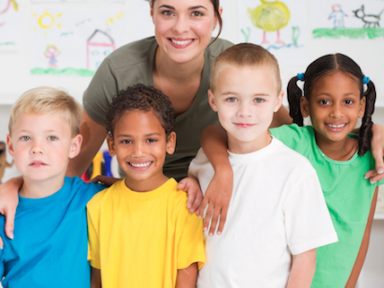
By Katherine R. Harrison, CPNP
Kindergarten readiness is simply the next step to school readiness which will eventually lead to career and life readiness. No wonder parents put themselves under so much pressure! The reality is that readiness has less to do with facts and figures and more to do with active engagement and attitudes in the home that occur every day, not just the first day of school. It’s fostering excitement and anticipation for the lessons to be learned. It’s establishing new routines and incorporating them into existing daily activities. It’s helping your child navigate new social situations by drawing upon previous interactions. It’s not the first step, but a continuation of the strong foundation you’ve already developed for your child to succeed!
Play therapy
Acting out an imaginary day or event at school can help you both become more familiar with social expectations. Construct a classroom, cafeteria, gymnasium, or the entire school with dollhouses, blocks, and/or magnetic tiles. Dress up and act out various new roles your child will encounter such as bus drivers, front office staff, school nurses, teachers and aides, librarians, and principals. Use dolls and stuffed animals to create classmates and explore how your child will interact with them. Give them a loose structure and let them direct the action of play. Often times this allows them to explore any insecurities in a safe, passive way with you beside them. As children get older, play therapy can progress to play dialogue where you coach them and help them find words they are comfortable using when presented with new or tough social situations.
Storytelling
Telling stories is a great way to personalize a concept that may seem more abstract to your child at any point in their life. It provides another reflective medium by which kids can safely investigate the various emotions they are having connected with an event. Visit your local library together and select a few from an abundance of books dealing with first day jitters, separation anxiety, academic success, diversity, or anti-bullying awareness. Tailor your selections to themes you think will benefit you and your child but also be open to exploring other unexpected topics that might come up while reading. Tell your own stories about school and encourage other family members to do the same. Compile a book that summarizes the stories you’ve explored with your child of how various book characters and family members prepared for and dealt with school readiness. Have your child direct a play based on your book and combine play therapy with storytelling. Take turns making up silly school bedtime stories. As children get older, storytelling might take the form of journaling, poetry, and song writing as a way to express themselves.
Active learning
Make learning tactile and kinetic. Supplement daily lessons with activities no teacher in their right mind would attempt with 25 students! Modify your activities based on current lessons or concepts with which your child might have frustration. The internet is bursting with creative ideas. Go on an alphabet scavenger hunt around the house. Set up an obstacle course in the back yard with a sight word at each check point. Use sidewalk chalk to draw numbers on the driveway to play hopscotch. Throw darts at various shapes taped on a board. See how many different colors you can find around the house in a certain amount of time. Pop balloons or paper bags filled with shaving cream to differentiate upper and lower case letters. Pretend you’re a robot and your child controls your movements with verbal commands to teach direction. Go on a real treasure hunt to apply map concepts. Practice handwriting with sticks in the dirt, bamboo skewers in flour, or candy canes in sugar. Have your child come up with their own game for you. There’s no wrong way to do it as long as you’re both moving! As children grow older, consider visiting science museums, art galleries, and music events to reinforce complex or new school topics.
Entering into a structured academic environment such as Kindergarten can be vastly different from what you and your child have experienced so far and, as such, can be inherently stressful. There are proactive plans you can make as a family to help mitigate that stress.
The information and content on our website should not be used as a substitute for medical treatment or advice from your doctor.

